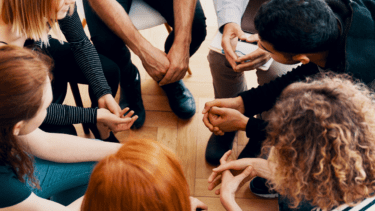Activist communities often tread gingerly around conflict. They know it tears activist groups apart, especially personal conflict. It has done so for decades.
Sometimes even political conflict tears activist groups apart. The groups find it difficult to work through disagreement on even ordinary political issues, especially in their first few meetings. Usually groups come together as voluntarily associations of people interested in a few topics, and they don’t have much in the way of long personal history and built-up trust.
Many groups react to all these things by avoiding conflict. They bury the conflict, pretending it doesn’t exist. In the short term, this provides some benefits. But it’s almost always a long term path to nowhere. Let’s talk about better ways to handle conflict, specifically modified consensus as a model.
Many react to this history by avoiding conflict. They bury it – pretend it doesn’t exist. This can help in the short-term. But it’s almost always a long-term path to nowhere. Let’s talk about better ways to handle conflict.
Democratic Discussion
Activist groups put in place process that often come from a good place, even from the honest intention of promoting democracy. But many of these processes don’t allow people to work through their disagreements and issues.
I’ve been part of lots of local orgs that included ‘political discussion’ of some kind in meetings. But the groups usually jam the agenda too full of topics and issues. As a result, they hurry along political discussion in a way that doesn’t allow for serious, substantive debate. Instead, a loose, superficial consensus emerges. And that consensus usually passes. It does so even when deeper thought and reflection would’ve revealed disagreement and perhaps a better, more democratic outcome.
In other words, orgs try to be democratic. But they practice superficial democracy over more substantive forms. They structure meetings in such a way that they feel democratic to the kinds of people who tend to take part in local activist groups. Basically, people sit in a circle and engage in open-ended, directionless discussion in meetings, try not to ‘impose’ moderation on the discussions, and so on. Often they enact the Lettuce Problem.
For people who aren’t already steeped in local activism – which is to say most people – these aren’t very democratic methods. Nor are they productive methods for anyone. There’s little sense of a shared project in this way of doing things. And there’s rarely space for deep, substantive discussion without direction and moderation.
Modified Consensus
I’ve thought for a long time about how to make it better. And I’ve tried implementing some of my ideas in local orgs I’ve lead.
I wrote a post awhile back, and I’d like to add to it a brief discussion of modified consensus. Groups need a way to move beyond open-ended discussion followed by rapid-fire action items. They need skilled facilitators to lead better meetings.
Furthermore, simple ‘majority rule’ doesn’t work as an alternative to the tyranny of structurelessness. It’s far too easy for a majority faction to ignore the perspective of others and impose its will on the group. This tends to happen in most forms of representative democracy, including groups like the DSA. At the same time, full consensus is unrealistic and utopian. In practice, it allows a tiny faction to block action.
Modified consensus enters at the point of the failure of majority rule and full consensus. Someone can start by proposing an idea or topic on which the group might take action. Ideally this gets added to the agenda before the meeting. The facilitator provides space for a democratic discussion that stays on topic, not an open-ended discussion that moves everywhere. To do this, they may switch speaking order, remind people to stay on topic, enforce time limits, and so on.
Meanwhile, the group tries to work toward full consensus. People can modify proposals based on the discussion. Eventually there’s a vote, where people can express their support or opposition. They can also express the strength of their opposition, with ‘no’ votes ranging from ‘I don’t like this’ to ‘I’d like to block this.’ If a proposal reaches full consensus, the group approves it. If not, they go back, hold another discussion, and go with what most people want. Hence, they find a modified consensus.
The Benefits
In short, modified consensus is about respecting people’s time by not veering off topic, but also about respecting different views and gaining everyone’s perspective. The group arrives at the best decision and one that has legitimacy with the whole group.
